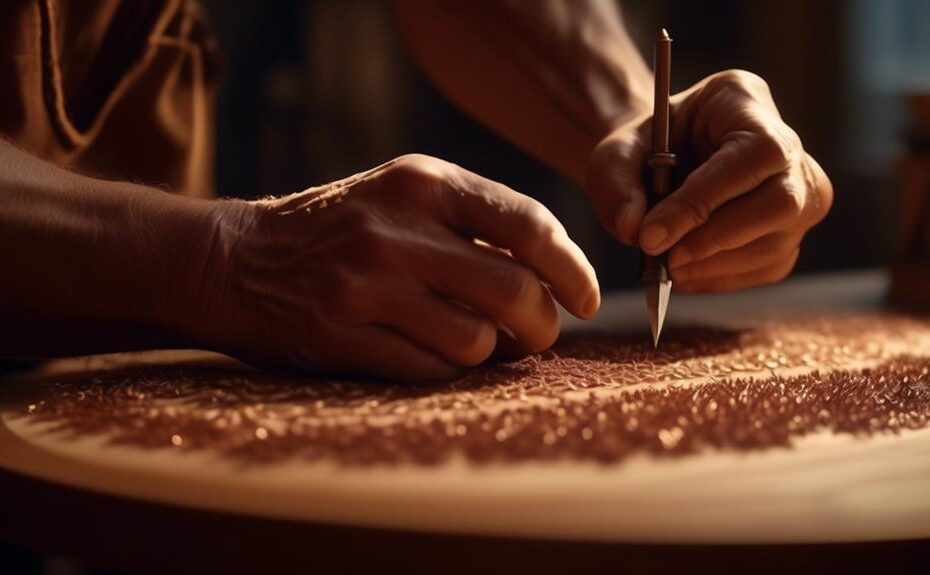Woodworking is a captivating craft that allows individuals to unleash their creativity and craftsmanship. With just a few tools and the right techniques, raw pieces of wood can be transformed into functional and visually appealing objects.
Whether you're a beginner or an experienced woodworker, there are endless possibilities for projects to explore. In this discussion, we'll delve into the world of woodworking, offering tips, tricks, and inspiration for your next woodworking endeavor.
Key Takeaways
- Essential woodworking tools such as high-quality chisels, hand planes, a sturdy workbench with a vise, and an assortment of clamps are necessary for precise and safe woodworking.
- Beginner-friendly woodwork projects should start with softwoods like pine or cedar, with a focus on wearing protective gear, maintaining a well-ventilated workspace, and gaining confidence and skills before moving on to hardwoods.
- Intermediate woodwork projects should involve using a variety of chisels and gouges for designs and textures, practicing proper tool handling and sharpening techniques, thoroughly sanding wood surfaces before staining, and applying wood conditioner to prevent blotching.
- Advanced woodwork projects involve mastering advanced techniques such as carving intricate details, creating complex curves, working with exotic wood species, learning advanced joinery techniques like dovetail and finger joints, and showcasing expertise and craftsmanship in stunning creations.
Essential Woodworking Tools
Woodworking projects require a selection of essential tools that are crucial for achieving precision and professional craftsmanship. When it comes to woodworking safety tips, having the right tools is essential.
First and foremost, a high-quality set of chisels is a must-have for any woodworker. Chisels allow for precise cutting and shaping, ensuring clean and accurate joinery.
Additionally, a set of hand planes is indispensable for smoothing and flattening surfaces. These versatile tools can quickly and efficiently remove material, allowing for a smooth finish.
A sturdy workbench with a vise is also necessary for securing materials and providing stability during woodworking tasks.
Lastly, an assortment of clamps is vital for holding pieces together while the glue dries. These must-have woodworking accessories will not only enhance safety but also improve the overall quality of your woodworking projects.
Beginner-Friendly Woodwork Projects
When starting out in woodworking, it is important to begin with projects that are beginner-friendly and allow for the application of essential woodworking skills acquired through the use of high-quality tools. Safety precautions should always be a priority for woodworking beginners. This includes wearing protective gear such as safety goggles, gloves, and a dust mask, as well as ensuring a well-ventilated workspace and keeping tools properly maintained.
In terms of choosing the right type of wood for beginner projects, it is recommended to start with softwoods such as pine or cedar. These woods are easier to work with and are more forgiving when mistakes are made. They also tend to be more affordable, allowing beginners to practice their skills without breaking the bank.
As confidence and skills grow, beginners can then progress to working with hardwoods such as oak or maple, which are more durable and offer a greater range of possibilities for projects.
Intermediate Woodwork Projects

To further advance your woodworking skills, intermediate woodwork projects offer a challenging yet rewarding opportunity to showcase your craftsmanship and creativity. These projects require a deeper understanding of wood carving techniques and the ability to achieve a flawless finish through proper staining and finishing techniques. Here are some essential tips for intermediate woodwork projects:
| Wood Carving Techniques | Finishing and Staining Tips |
|---|---|
| Use chisels and gouges of different shapes and sizes to create intricate designs and textures on the wood surface. | Before staining, make sure to sand the wood surface thoroughly to achieve a smooth finish. |
| Experiment with different carving methods such as relief carving, chip carving, and whittling to add depth and dimension to your projects. | Apply a wood conditioner before staining to ensure even absorption and prevent blotching. |
| Practice proper tool handling and sharpening techniques to achieve clean and precise cuts. | Apply multiple coats of stain, allowing each coat to dry thoroughly, and sand lightly between coats for a professional-looking finish. |
Advanced Woodwork Projects
Continuing the journey of honing your woodworking skills, advanced woodwork projects offer a remarkable opportunity to showcase your expertise and craftsmanship in intricate and demanding creations. These projects require a deep understanding of advanced woodworking techniques and the ability to execute complex woodworking joinery.
Advanced woodworking techniques involve mastering skills such as carving intricate details, creating complex curves, and working with exotic and challenging wood species. These projects often require a high level of precision, as even the smallest error can compromise the final result.
Advanced woodworking joinery techniques, such as dovetail joints, mortise and tenon joints, and finger joints, are essential for creating strong and visually appealing structures. These joinery methods require meticulous attention to detail and precise cutting and fitting of the wood pieces.
Undertaking advanced woodwork projects allows you to push the boundaries of your skills, learn new techniques, and create stunning pieces that will impress even the most discerning woodworking enthusiasts.
Frequently Asked Questions
What Are Some Safety Precautions to Keep in Mind When Working on Woodwork Projects?
When engaging in any type of project involving woodworking, it is crucial to prioritize safety precautions. This includes understanding the proper use of tools and equipment, wearing appropriate protective gear, and maintaining a clean and organized workspace.
How Long Does It Typically Take to Complete a Woodwork Project?
When it comes to effectively managing time while working on any project, including woodwork projects, it is important to consider various factors such as project complexity, available resources, and personal skill level. Additionally, staying motivated throughout the completion of a woodwork project can be achieved by setting clear goals, breaking the project into smaller tasks, and celebrating milestones along the way.
Are There Any Specific Types of Wood That Are Better Suited for Certain Projects?
Certain types of wood are better suited for specific woodworking projects. Understanding the best types of wood for different projects is crucial for achieving optimal results. Using specific types of wood in woodworking projects offers numerous benefits, such as durability, strength, and aesthetic appeal.
What Are Some Common Mistakes That Beginners Make When Starting Out in Woodwork Projects?
Common mistakes that beginner woodworkers make when starting out in woodworking projects include not taking proper safety precautions, underestimating the time it takes to complete a project, using the wrong types of wood, and mishandling power tools. It is important for beginners to be aware of these pitfalls and to focus on beginner-friendly designs.
Can Woodwork Projects Be Done Without the Use of Power Tools?
Alternative methods for woodworking exist that allow for the completion of woodwork projects without the use of power tools. Traditional woodworking techniques, such as hand saws, chisels, and hand planes, can be employed to achieve precise and detailed craftsmanship.
Conclusion
In conclusion, woodworking projects offer a rewarding and creative outlet for individuals of all skill levels.
With the right tools and guidance, beginners can successfully complete simple projects such as a wooden planter box or a picture frame.
As skills progress, intermediate woodworkers can tackle more complex projects like a coffee table or a bookshelf.
For those seeking a challenge, advanced woodwork projects like a rocking chair or a custom cabinet provide an opportunity to showcase craftsmanship and expertise.
Woodworking truly offers endless possibilities for those passionate about creating with their hands.




